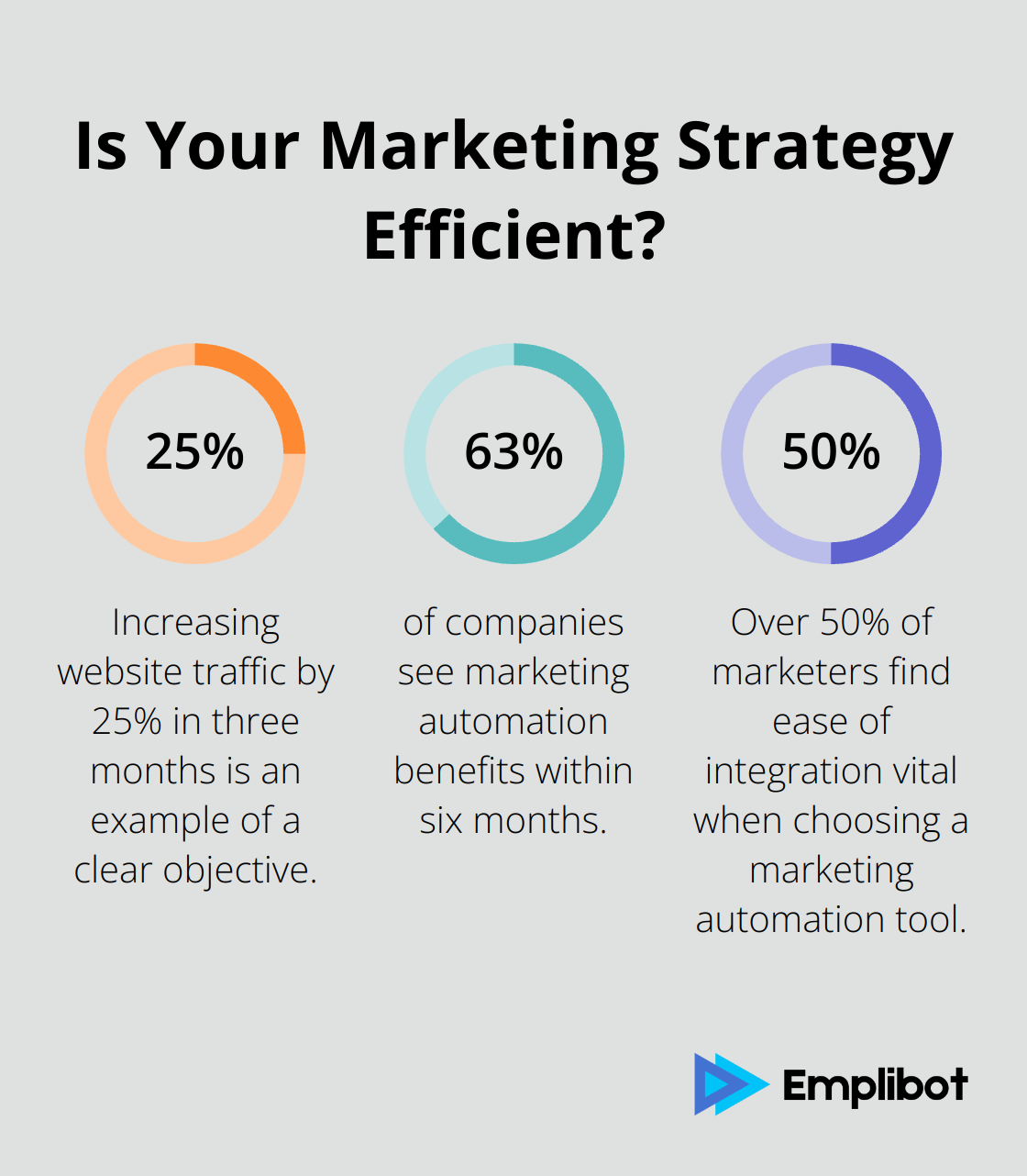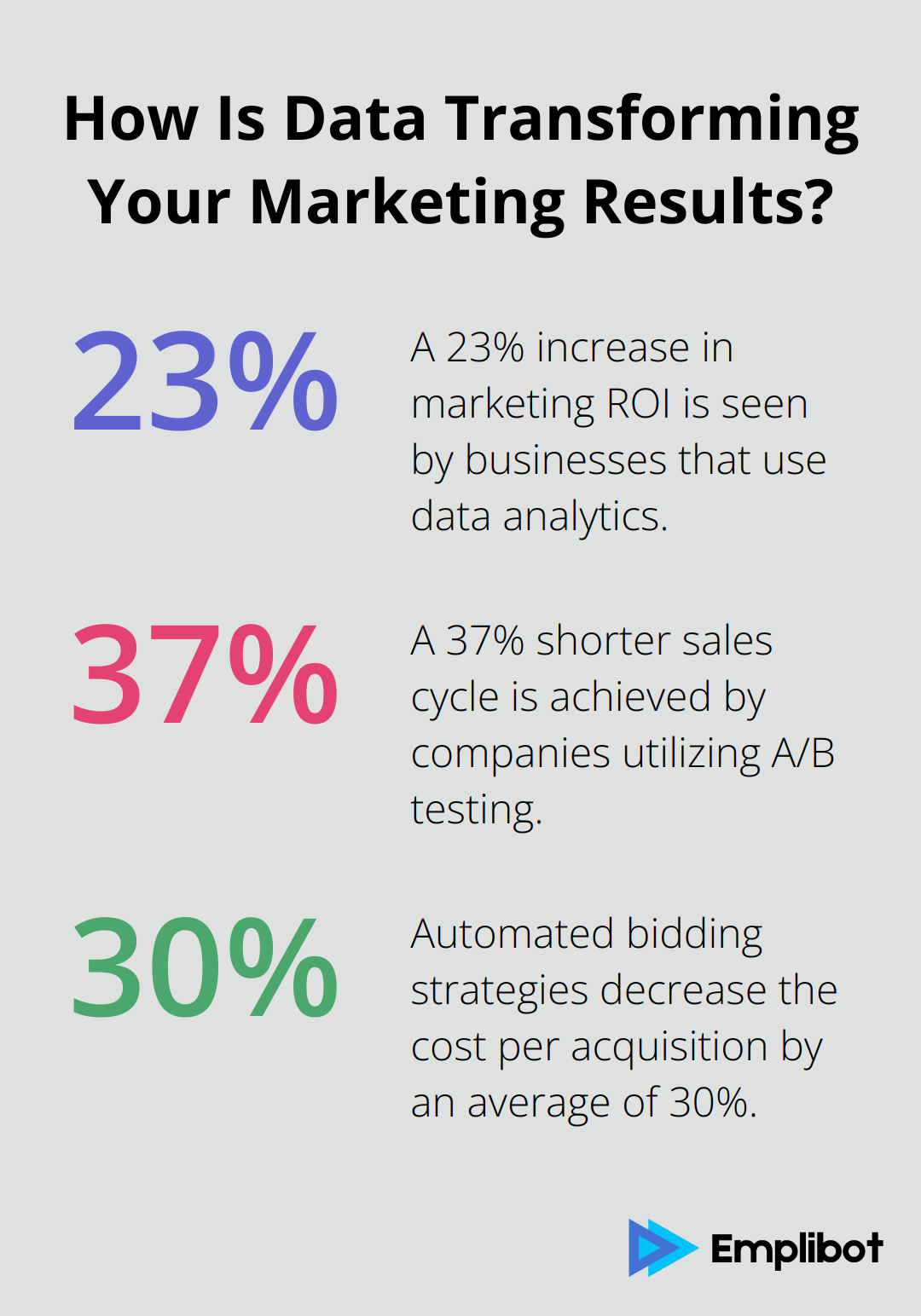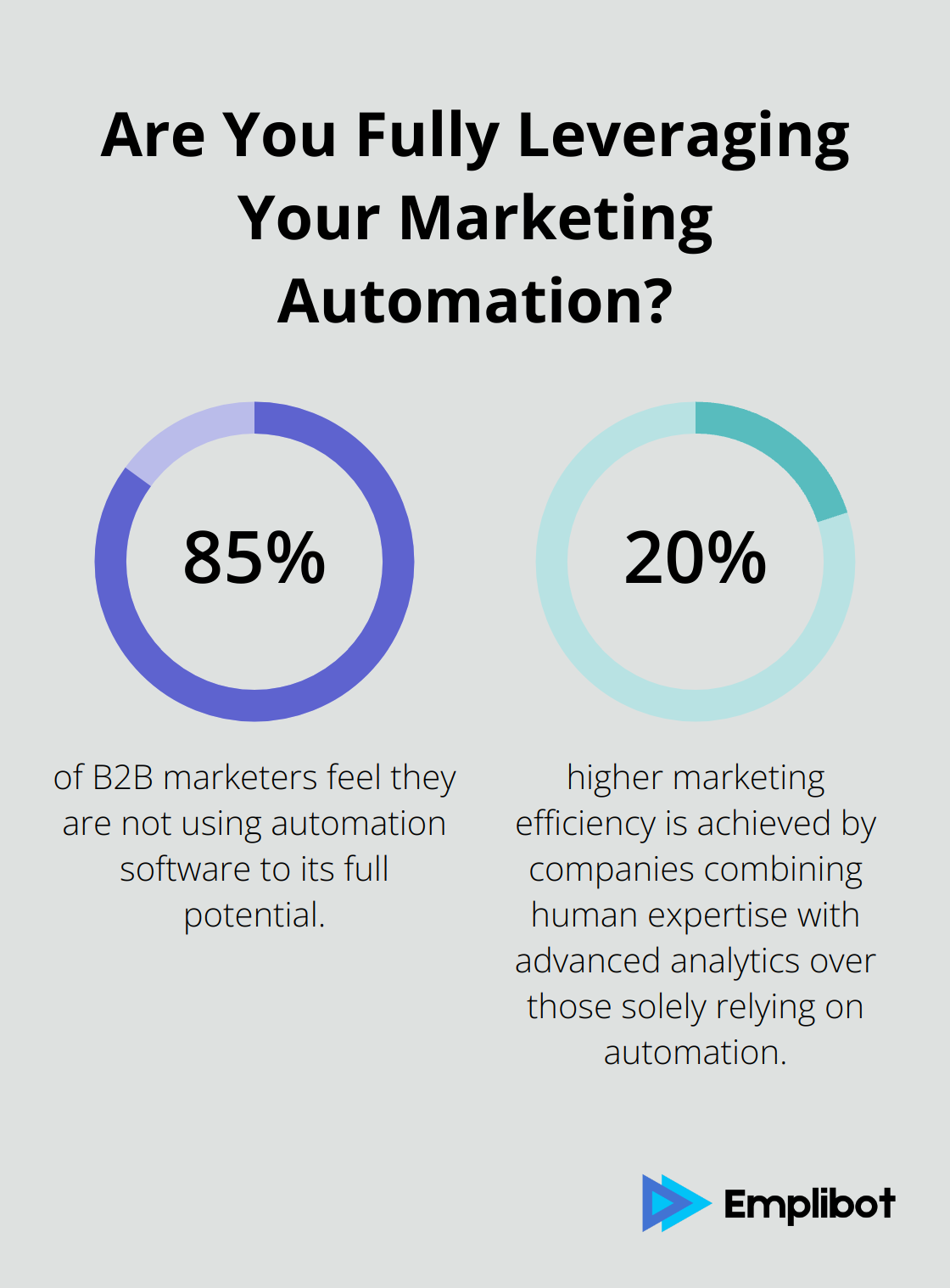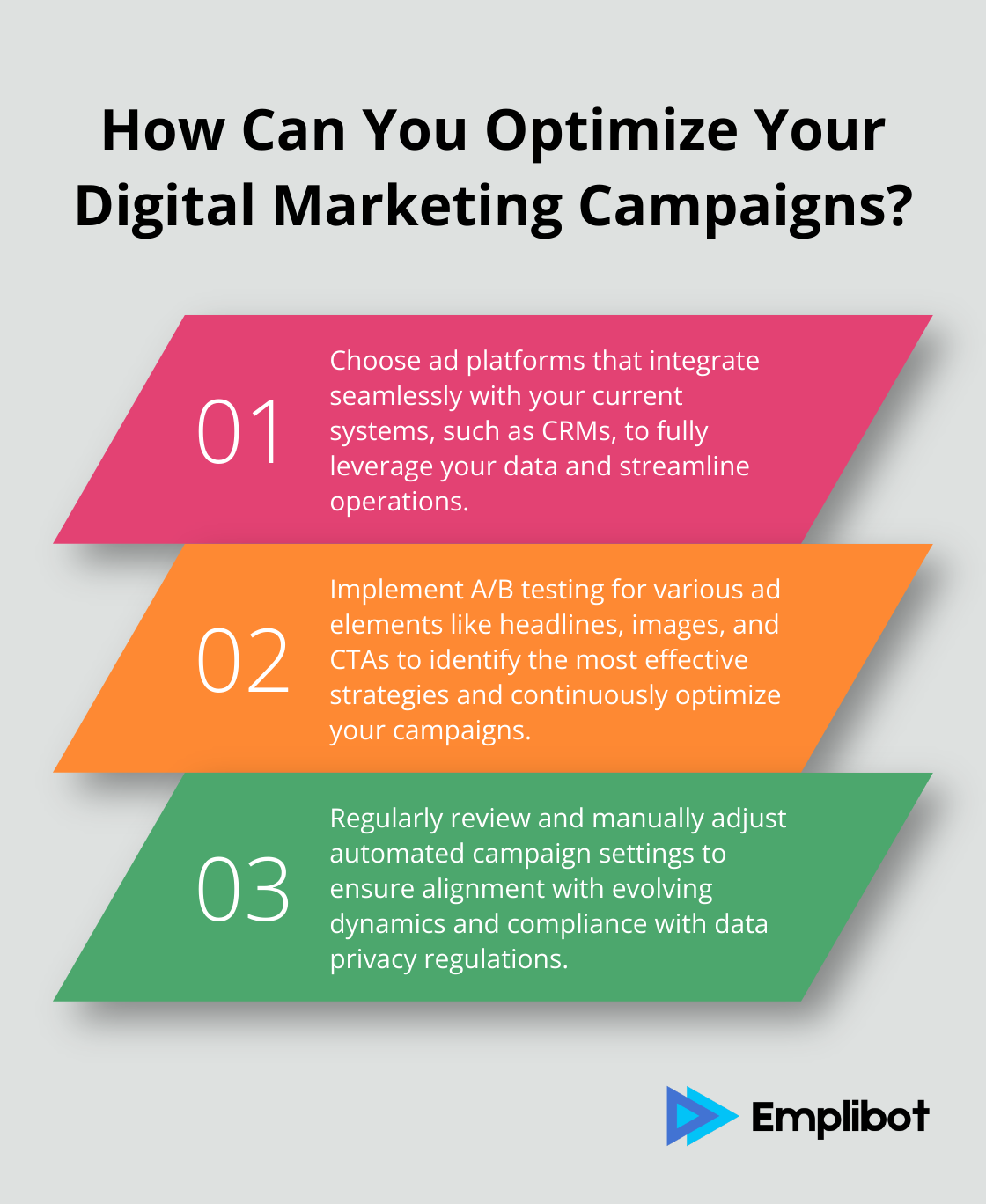Automated ad campaigns can save time and increase efficiency, but to see the best results, they need careful planning and continuous monitoring.
At Emplibot, we’ve seen how the right approach can transform campaign performance.
In this post, we’ll cover strategies and tips for setting up, optimizing, and avoiding common pitfalls in automated ad campaigns.
Contents
ToggleHow to Set Up Automated Ad Campaigns
To run automated ad campaigns successfully, it all starts with a solid setup. Here’s how to set the stage for your campaigns to thrive.
Choosing the Right Tools and Platforms
The first step in setting up automated ad campaigns is picking the right tools. Google Ads and Facebook Ads are industry standards, but the landscape is crowded with powerful alternatives. Platforms like MoEngage provide AI-powered optimization and real-time alerts which can be lifelines for your campaigns.

It’s crucial to prioritize platforms that integrate with your existing systems. For instance, if you’re using a CRM system, ensure your ad platform can sync seamlessly to leverage your data effectively. According to a survey by Capterra, over 50% of marketers find ease of integration vital when choosing a marketing automation tool.
Defining Clear Goals
Without clear objectives, even the best tools will falter. Start by pinpointing specific goals like increasing website traffic by 25% in three months or boosting conversions by 15%. Defined KPIs will help you measure success and make adjustments when necessary. For example, 63% of companies see marketing automation benefits within six months, emphasizing the need for well-outlined goals from the get-go.
Effective Audience Segmentation
Segmenting your audience is non-negotiable for achieving personalized and effective ad campaigns. Using behavioral data, segment your audience into distinct groups based on their actions, like past purchases or website interactions. Platforms like Google Analytics offer robust segmentation tools to refine your target groups further.
Tailoring your ads to these segments can increase engagement dramatically. For instance, segmented campaigns see a 14.31% higher open rate and a 100.95% higher click-through rate than non-segmented campaigns, according to Mailchimp’s 2019 Email Marketing Benchmarks report.
Personalize your message for each group rather than casting a wide net. Use dynamic content to match the specific needs and wants of each segment, significantly driving up your ROI.
Practical Links
To dive deeper into setting effective KPIs and audience segmentation, check out smart marketing objectives or explore segmentation strategies.
How to Optimize and Monitor Campaigns
Proper data analytics and A/B testing can transform a campaign from adequate to outstanding. Here’s how to harness these tools effectively.
Use Data Analytics to Track Results
Data is your campaign’s lifeline. Implementing robust analytics tools ensures you track every essential metric. Tools like Google Analytics can provide you with comprehensive insights into user behavior, ad performance, and ROI. Analyzing these metrics helps you identify what’s working and what needs adjustment.

Consider this: businesses that use data analytics see a 23% increase in marketing ROI, according to McKinsey. Weekly or bi-weekly reports allow you to stay on top of performance, making real-time adjustments as necessary.
A/B Test Different Strategies
A/B testing isn’t just an option; it’s a necessity. By testing different ad versions, you can pinpoint what resonates most with your audience. Variables to test include headlines, images, CTAs, and overall ad copy. Platforms like Facebook Ads Manager offer excellent A/B testing features to streamline this process.
For example, companies utilizing A/B testing see a 37% shorter sales cycle, according to a study by Econsultancy. Continually test new variations and integrate successful elements into your main campaign.
Adjust Bidding and Budget Based on Performance
Static bidding strategies can hamstring your campaign. Dynamic bidding, adjusting based on performance data, is key. Smart bidding strategies on Google Ads, like Target CPA and Target ROAS, use machine learning to optimize bids and maximize conversions.
A WordStream study shows that automated bidding strategies decrease the cost per acquisition by an average of 30%. Regularly reviewing your bidding settings and budgets, and reallocating funds to high-performing segments, can significantly improve your ad performance.
For more detailed guidance on PPC campaign management, check out our resource on managing PPC campaigns.
Avoiding Pitfalls in Automated Ad Campaigns
Over-Reliance on Automation
Automation tools can optimize and streamline your campaigns, but relying too heavily on them can be a risky move. While automated systems like Google’s Smart Bidding and Facebook’s Automated Rules offer fantastic efficiency, they should never fully replace strategic human decision-making. For instance, even the most advanced algorithms cannot match the nuanced judgment of seasoned marketers who understand subtle shifts in consumer behavior and market trends.

Studies indicate that 85% of B2B marketers feel they are not using automation software to full potential, often due to over-relying on automation without complementary human insights. Regularly review and tweak automated settings to align them with evolving campaign dynamics. Incorporating periodic manual reviews ensures a balanced approach where technology and human skills work in harmony.
Data Privacy Concerns
Data privacy is a critical issue in the digital advertising landscape. Automated ad campaigns often require extensive data collection and analysis, raising significant privacy concerns. Non-compliance with regulations like GDPR and CCPA can result in hefty fines and damage to reputation. According to a DLA Piper survey, GDPR fines hit €1.1 billion in 2021 alone, underscoring the seriousness of this issue.
To mitigate risks, ensure your data collection practices comply with all relevant laws. Use consent management platforms to capture and store user permissions efficiently. Tools like OneTrust can streamline this process by offering comprehensive solutions for privacy management. Regular audits of data handling processes and transparency in consumer data usage can further build trust and minimize regulatory risks.
The Necessity of Human Oversight
Human oversight is indispensable in automated ad campaigns. Algorithms can become outdated, miss context, or misinterpret data. Regularly scheduled manual reviews and interventions can catch these errors before they escalate. For instance, a mere adjustment of ad copy or visual elements based on current trends can significantly enhance campaign performance.
A McKinsey report highlights that companies combining human expertise with advanced analytics achieve 20% higher marketing efficiency over those solely relying on automation. Periodic checks and balances allow the campaign to stay relevant, adapt to market changes, and maintain its effectiveness. Tools like Google Analytics and Facebook Insights can provide real-time data to assist in these manual checks.
For additional insights into effective automated ad campaign management, check out our resource on automated PPC management.
By meticulously monitoring your automated ad campaigns, addressing privacy concerns, and maintaining a balance between automation and human oversight, you set your campaigns on a path to sustainable success.
Conclusion
Running successful automated ad campaigns demands a strategic approach right from the setup phase. It’s essential to choose the right tools and platforms, define clear goals, and segment your audience effectively. This groundwork supports a campaign that can seamlessly adapt and perform.

Continuous monitoring and adjustment are vital. By leveraging data analytics and A/B testing, you can fine-tune your efforts and maximize your ROI. Tools like Google Analytics and Facebook Ads Manager are invaluable in this optimization process. Dynamic bidding and budget adjustments based on performance data can further enhance your campaign’s efficiency.
It’s important to embrace automation but do so with caution. While automation offers immense advantages, over-reliance on it can lead to missed opportunities. Balancing automated strategies with human oversight ensures that your campaigns stay relevant and effective, steering clear of pitfalls like outdated algorithms or data privacy issues.
Emplibot supports businesses in automating their content marketing, including SEO-friendly articles, keyword research, and more. To learn how Emplibot can enhance your marketing efforts, visit emplibot.com.
Expertly blending technology and human judgment will set your automated ad campaigns on a path to sustained success.











